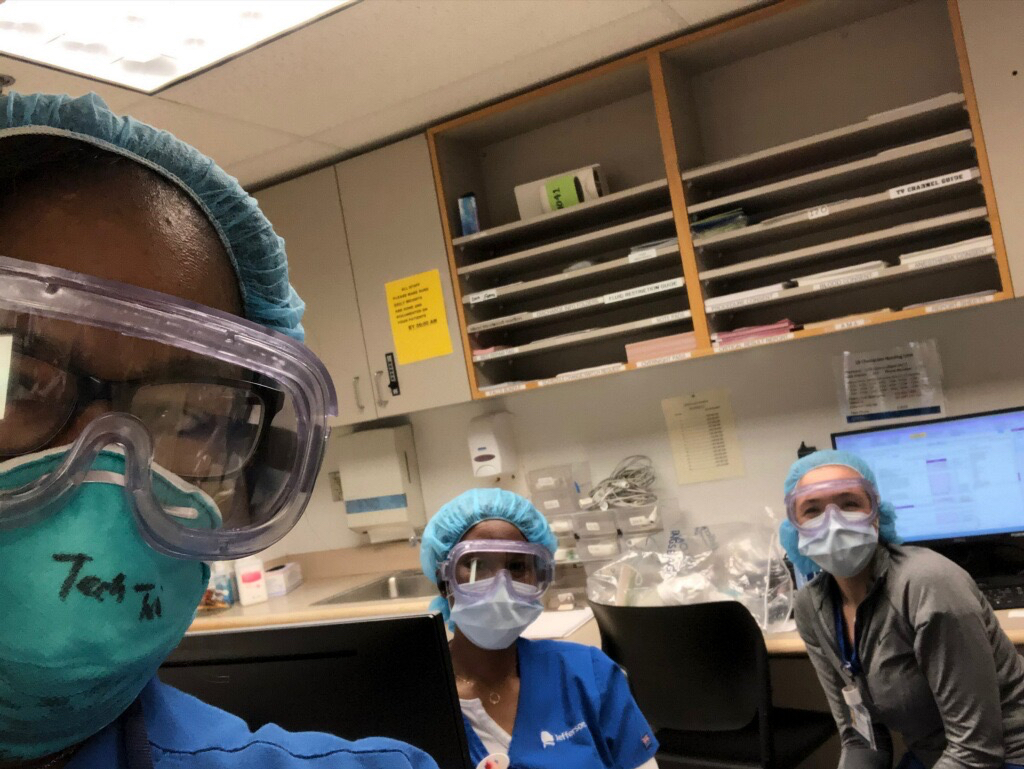Prepared for Change
Jefferson takes creative approach to remote learning.
Over the last decade, many students considered online learning a convenience, but with the COVID-19 pandemic, it has become a necessity. Around the world, students and faculty have vacated the physical classroom and entered a virtual one. Luckily, Jefferson faculty and staff were prepared for such an occasion.
The College of Architecture and the Built Environment, for example, quickly and efficiently moved to an online format, says Executive Dean Barbara Klinkhammer. She praised faculty and staff on the swift transition.
“Having professors Rob Fleming and Robert Fryer on our faculty, who both have been mastering online studio teaching in the M.S. in sustainable design program for many years, propelled our college to the forefront of smoothly shifting to remote teaching during the COVID-19 pandemic,” she says. “Within one week, we got everybody up to speed. We rolled out a series of recorded workshops and trained our faculty to provide an excellent academic experience in an online format.”
Students continue to collaborate via Zoom for classes and studio time. In fact, many have created studios in their own homes where they can continue to perfect their projects. For instance, architecture student Drake Schaefer set up a 3D printing lab in his garage where he’s continuing to support ongoing research projects in the college and printing masks and head shields.
Architecture professor Andrew Hart worked with Schaefer to set up the 3D printing lab. “By utilizing the central location and our online format, we were able to rework our program to accommodate distance and asynchronous learning,” Hart says.
Students continue to collaborate via Zoom for classes and studio time. In fact, many have created studios in their own homes where they can continue to perfect their projects.
Along with the College of Architecture and the Built Environment, the Jefferson College of Nursing (JCN) also had a head start on the move to remote learning. A key JCN initiative is its engagement with Apple, which allows the college to equip all faculty, staff and students—undergraduate, graduate and doctoral—with iPads, immersing them in technological skills essential as students move on to their careers.
Through the JeffLEARN (Lead Engage Advance Reimagine Nursing) initiative, JCN deploys more than 800 iPads annually and integrates Apple technologies and other digital applications in classrooms (virtual and onsite), simulation rooms, and clinical settings across Jefferson and beyond. Apple Professional Learning sessions immerse faculty in professional development delivered by Apple Learning Specialists.
Since 2018, Jefferson graduate nursing students have been utilizing an online program called Shadow Health, which simulates real-life clinical training through virtual patient encounters. In this digital environment, students practice skills and develop competencies by interacting with digital standardized patients.
“JCN’s relationship with Apple facilitates high-level leadership in the use of academic technology and has enabled us to seamlessly pivot all of our academic programming to online and simulated platforms,” says JCN Dean Dr. Marie Marino. “Our technology-rich environment supports collaboration, inspires creativity and promotes the use of applications that foster critical thinking, like Shadow Health, among others.”
These elements have been crucial in allowing students to continue their education at home during this public health crisis.
Jefferson also upgraded faculty to Zoom Pro accounts, which allows for classes of up to 300 students. To maintain an appropriate and engaged schedule for students, online classes typically meet at the same time as the in-person sessions. Faculty maintain their same office hours, but they can be available via webchat or phone as needed.
Faculty can hold live lectures during their set class time; however, some choose to record their lectures and post to the learning management system Canvas. With recorded lectures, students can review ahead of time and discuss as a group during the designated class session.
Our technology-rich environment supports collaboration, inspires creativity and promotes the use of applications that foster critical thinking.
Students continue to take tests on their iPads using a web-based application that has checks and balances to preserve academic honesty and exam integrity (i.e., 72-second response time per question—similar to NCLEX response time; code-enabled access; and notifications to faculty should a student navigate away from the exam, among others).
“Fortunately, Dr. Marino came to us a year ago with a strong focus on integrating technology with our curriculum,” says Dr. Hannah Smith, assistant dean. “We have had our eye on the future and have been working directly with Apple Professional Learning specialists to integrate the latest academic technologies into our curricula. It has served us well during the current crisis.”



